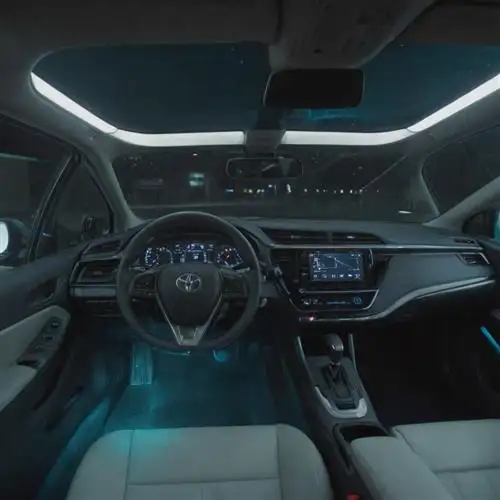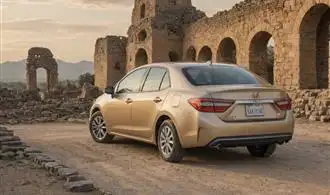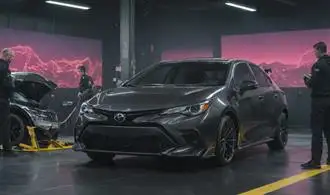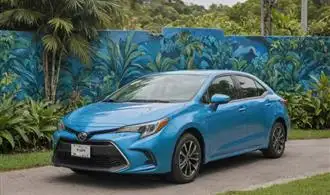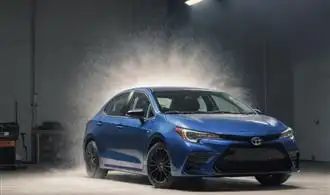
Design and Styling Comparison
In the ongoing battle between the Toyota Corolla and the Honda Civic, the design and styling comparison is a crucial factor that often sways the decision of prospective buyers. Both these compact cars have distinct aesthetics that cater to different preferences, and understanding the nuances can help consumers make an informed choice.
The Toyota Corolla, known for its timeless and understated elegance, boasts a refined and sophisticated exterior design. The sleek lines, bold grille, and well-proportioned silhouette exude a sense of maturity and confidence. The latest Corolla models feature a more angular and aerodynamic profile, giving the car a modern and dynamic appearance. The interior of the Corolla is equally impressive, with a well-thought-out cabin layout that prioritizes functionality and driver-centric controls.
On the other hand, the Honda Civic presents a more youthful and sporty aesthetic. The Civic's design language is characterized by sharp creases, bold curves, and a more aggressive front fascia. This dynamic styling cue appeals to a younger demographic, conveying a sense of excitement and energy. The Civic's interior also follows a more contemporary design, with a focus on technology integration and a driver-oriented cockpit layout.
When it comes to the dimensions, the Corolla and Civic are relatively similar in size, offering ample passenger and cargo space. However, the Civic's slightly longer wheelbase and wider track give it a more planted and stable stance on the road, enhancing its sporty driving dynamics. The Corolla, on the other hand, maintains a more compact and maneuverable profile, making it an ideal choice for urban environments.
Performance and Efficiency Showdown
The Toyota Corolla and Honda Civic are two of the most popular compact cars on the market, known for their reliability, practicality, and affordability. When it comes to performance and efficiency, these two rivals offer a surprising and compelling comparison.
Under the hood, the Toyota Corolla boasts a 1.8-liter four-cylinder engine that delivers 139 horsepower and 126 lb-ft of torque. This power plant is paired with a continuously variable transmission (CVT) that helps optimize fuel efficiency. The Corolla's EPA-estimated fuel economy stands at an impressive 31 mpg in the city and 38 mpg on the highway, making it a standout in its class for fuel-sipping performance.
In contrast, the Honda Civic is equipped with a 2.0-liter four-cylinder engine that produces 158 horsepower and 138 lb-ft of torque. While it offers slightly more power than the Corolla, the Civic's EPA-estimated fuel economy is also impressive, with ratings of 30 mpg in the city and 38 mpg on the highway. Buyers have the choice of a six-speed manual transmission or a CVT, providing a balance of engaging driving dynamics and efficient performance.
When it comes to acceleration, the Civic holds a slight advantage, with a 0-to-60 mph time of around 8 seconds, compared to the Corolla's 9.8-second sprint. This difference is noticeable in everyday driving situations, where the Civic feels a bit more responsive and lively. However, the Corolla's smooth and refined CVT transmission helps compensate for the power deficit, delivering a comfortable and composed ride quality.
In terms of handling, both the Corolla and Civic offer a predictable and stable driving experience, with well-tuned suspensions and responsive steering. The Civic, with its slightly sportier DNA, may appeal more to enthusiast drivers who enjoy a more engaging behind-the-wheel experience. The Corolla, on the other hand, prioritizes a comfortable and composed ride, making it an excellent choice for daily commuting and long-distance travels.
Interior Comfort and Technology Comparison
When it comes to the Toyota Corolla and Honda Civic, the battle for interior comfort and technology is a closely contested one. Both vehicles offer a comfortable and well-equipped cabin, but there are some distinct differences that prospective buyers should consider.
In terms of overall interior design, the Corolla boasts a modern and refined aesthetic, with a clean and uncluttered dashboard layout. The materials used throughout the cabin are of good quality, with a nice balance of soft-touch surfaces and durable plastics. The seats in the Corolla are supportive and offer a good amount of adjustability, ensuring a comfortable driving position for a wide range of body types.
The Honda Civic, on the other hand, has a more dynamic and sporty-inspired interior design. The dashboard features a more pronounced center stack, which houses the infotainment system and climate controls. The materials used are generally of a high quality, though some may find the overall design a bit more cluttered compared to the Corolla.
When it comes to technology and connectivity features, both the Corolla and Civic offer a comprehensive suite of options. The Corolla's infotainment system is easy to use and responsive, with standard features like a 7-inch touchscreen display, Apple CarPlay, and Android Auto. Higher trim levels of the Corolla also offer an upgraded 8-inch touchscreen and a premium audio system.
The Civic, on the other hand, boasts a more advanced infotainment system with a larger 7- or 9-inch touchscreen display, depending on the trim level. The Civic's system offers a more comprehensive suite of connected services and customization options, though some may find the interface a bit more complex to navigate compared to the Corolla's more straightforward system.
In terms of other technology features, both the Corolla and Civic offer a range of advanced safety and driver assistance systems, such as automatic emergency braking, lane departure warning, and adaptive cruise control. The Civic, however, may have a slight edge in this area, with a more comprehensive suite of standard safety features across the lineup.
Safety and Reliability Features Evaluated
When it comes to safety and reliability, the Toyota Corolla and Honda Civic are two of the most highly-regarded vehicles in their class. Both models boast an impressive array of features designed to keep drivers and passengers secure on the road. Let's take a closer look at how they measure up.
The Toyota Corolla comes standard with a suite of advanced safety technologies, including Toyota Safety Sense, a comprehensive package that includes features like pre-collision system with pedestrian detection, lane departure alert with steering assist, and automatic high beams. The Corolla also offers available features like full-speed range dynamic radar cruise control and road sign assist. These cutting-edge systems work together to provide a heightened level of awareness and responsiveness, helping to prevent accidents and mitigate the impact of collisions.
In terms of reliability, the Toyota Corolla has long been recognized as one of the most dependable vehicles on the market. With a reputation for exceptional build quality and a track record of consistent performance, the Corolla is known for its ability to withstand the rigors of daily driving and retain its value over time. According to industry data, the Corolla boasts above-average reliability ratings, with fewer reported issues compared to many of its competitors.
The Honda Civic also offers an impressive array of safety features, with standard equipment like collision mitigation braking system, lane keep assist, and road departure mitigation. The Civic's available Honda Sensing suite provides even more advanced safety technologies, including adaptive cruise control, traffic sign recognition, and blind spot monitoring. These features work in tandem to create a comprehensive safety net, helping to keep drivers and passengers protected in a variety of driving scenarios.
When it comes to reliability, the Honda Civic has also earned a strong reputation. With a well-designed and durable construction, the Civic is known for its ability to withstand the demands of daily use and maintain its performance over the long haul. While the Corolla may have a slight edge in overall reliability, the Civic is still widely considered one of the most dependable vehicles in its class.
Price and Value Proposition Comparison
When it comes to the ultimate showdown between the Toyota Corolla and the Honda Civic, the price and value proposition comparison is a crucial factor to consider. Both vehicles are renowned for their reliability, fuel efficiency, and overall affordability, making them perennial favorites among budget-conscious consumers. However, a deeper dive into the pricing structures and value offerings of these two titans of the compact car segment reveals some interesting insights.
The Toyota Corolla has long been celebrated for its exceptional value proposition. With a starting MSRP that typically ranges from $20,000 to $25,000, depending on the trim level and optional features, the Corolla offers a well-equipped and feature-rich package at a highly competitive price point. One of the key advantages of the Corolla is its renowned reliability and longevity, which can translate to lower long-term ownership costs for the consumer. Additionally, the Corolla's reputation for excellent fuel economy and low maintenance requirements further enhance its value proposition.
On the other hand, the Honda Civic, while often regarded as a formidable competitor to the Corolla, generally commands a slightly higher price tag. The Civic's starting MSRP typically falls between $22,000 and $28,000, with the higher-end trims and optional packages pushing the price even further. However, the Civic's reputation for exceptional build quality, advanced safety features, and a more engaging driving experience may justify the slightly higher price tag for some consumers. The The Controversial Truth About the Toyota Corolla and the Mitsubishi Lancer also highlights the Civic's position as a more premium offering in the compact car segment.



